The Namibian President launched the country’s revised National Gender Policy, which the United Nations Population Fund (UNFPA) contributed towards, at an event to mark International Women’s Day in the capital city of Windhoek. UNFPA Namibia Country Office provided both financial and technical support to the Government for reviewing the old policy and developing the new one.
The updated document was announced by the President of Namibia, Mr. Hifikepunye Pohamba, who reiterated the Government’s support for a fifty-fifty representation of women in decision-making positions.
At the event, UN Secretary-General Ban Ki-moon said the United Nations will continue supporting the Government of Namibia, civil society and other partners in the promotion of gender equality and the empowerment of women. This message was delivered by Mr. Musinga Bandora, Resident Co-ordinator, on behalf of the UN system in Namibia.
Namibia developed and adopted its first National Gender Policy (NGP) in 1997. This aimed at closing the gaps created by the socio-economic, political and cultural inequalities that existed previously in Namibian society. To ensure the implementation of the policy, a National Gender Plan of Action was developed in 1998.

In 2010, a review of the 1997 policy was conducted, which showed that some progress had been achieved in the advancement of gender equality and women’s empowerment in Namibia, particularly in economic, political, legal and educational spheres. However, despite this progress, many challenges still remained to be addressed to achieve true equality.
For instance, women and girls in Namibia face a high rate of gender-based violence, an increasing prevalence of HIV and AIDS, a high maternal death rate, under-representation at most levels of decision-making, and poverty. This is worsened by gender inequalities within the family, where women’s financial dependency on men undermines their right to self-determination.
In addition, since the first policy, new emerging issues at the global, regional and national levels are influencing the attainment of gender equality, namely; international economic development issues, globalization and climate change, human trafficking and the worsening of the HIV and AIDS pandemic. These hastened the development of a new policy to address the gaps.
The Namibia National Gender Policy (2010-2020) seeks to create an enabling environment for sectors to mainstream gender in line with National Development Plans (NDPs). It identifies who will be responsible for the implementation of the policy and who will be accountable for gender equality results.
Compared to the first policy, the new policy has 12 critical areas of concern, with two new areas of peace-building and conflict resolution, and natural disaster management; and gender equality in the family context. Other areas have been made more comprehensive to address emerging issues.



